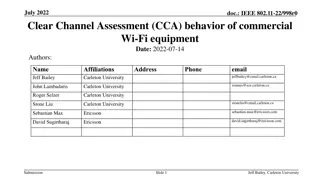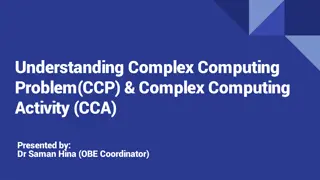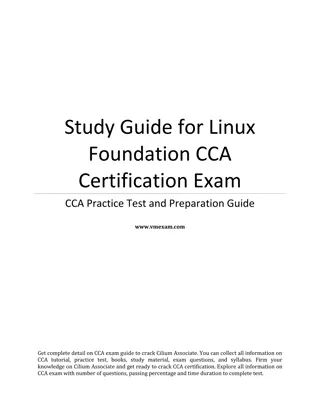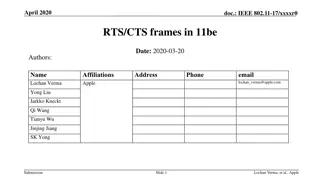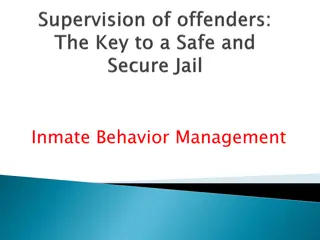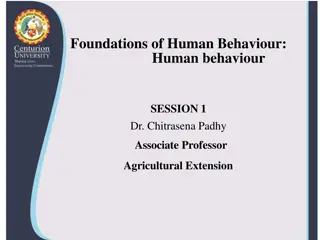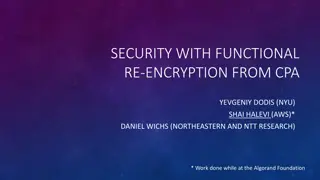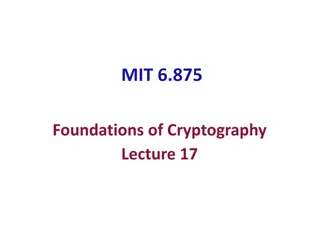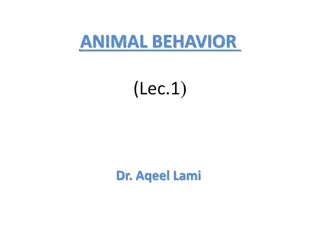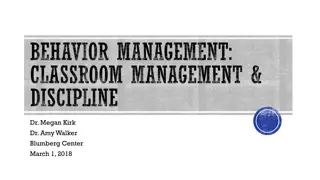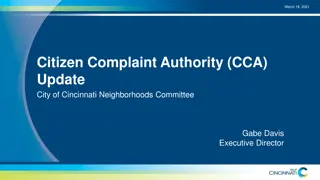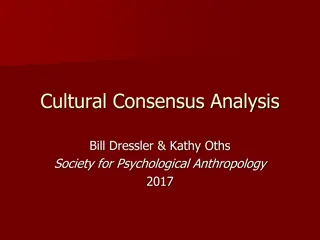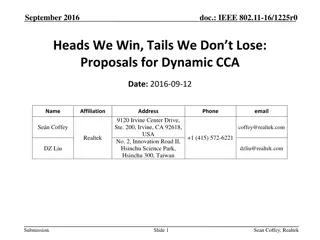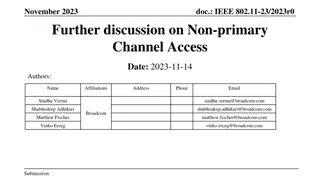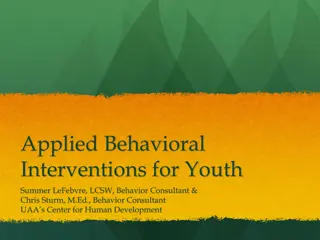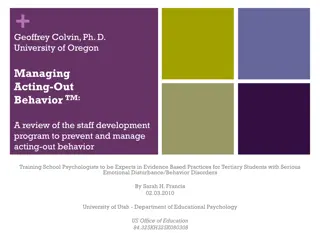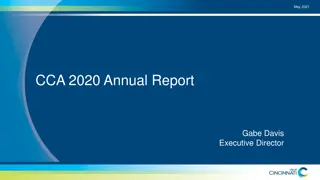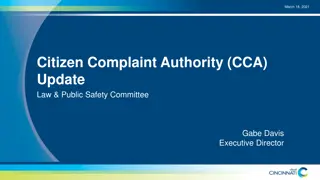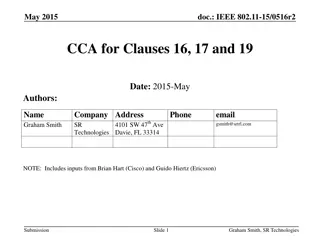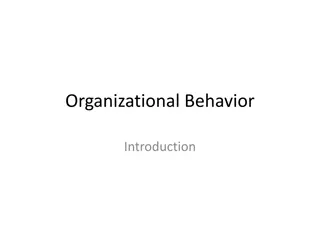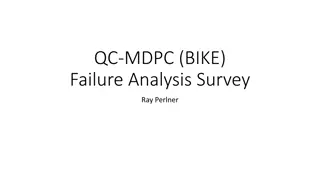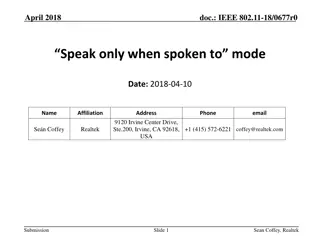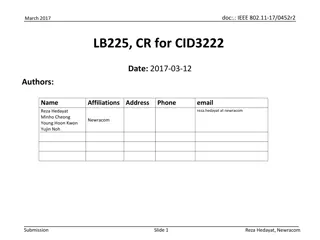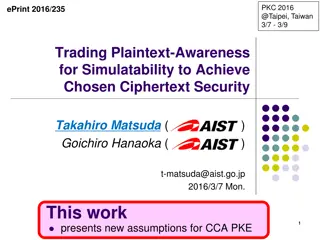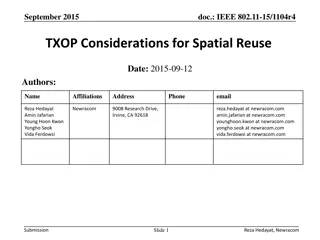Function Based Thinking
Function-based thinking in Missouri Schoolwide Positive Behavior Support, emphasizing data-based decision-making, mission clarity, and effective teaching practices. Understand how behavior is related to the environment and how environmental interventions play a key role in shaping expected behaviors
6 views • 27 slides
Addressing Predatory Behavior in the Fellowship
Predatory behavior, especially towards vulnerable members, is a concerning issue in the fellowship. This behavior includes unwelcome advances, exploitation of power dynamics, and institutional sexism. The discussion on predatory behavior necessitates honest dialogue and a united approach for a safer
3 views • 13 slides
Understanding Consumer Behavior in Marketing
The design of a marketing program starts with understanding consumer behavior. Consumers, as the end users, play a crucial role in shaping market trends. Producers seek insights into consumer personas, market behaviors, and influencing factors. Management focuses on the consequences of consumer beha
2 views • 26 slides
Clear Channel Assessment (CCA) Behavior of Commercial Wi-Fi Equipment
This document, dated July 2022, delves into the Clear Channel Assessment (CCA) behavior of commercial Wi-Fi equipment in response to Narrowband Frequency Hopping (NB FH) signals. It explores the regulatory framework around license-exempt frequency bands in the USA and Europe, highlighting the specif
0 views • 22 slides
Understanding Complex Computing Problem (CCP) and Complex Computing Activity (CCA)
Dr. Saman Hina, along with Dr. Farrukh Arif and Dr. Maria Waqas, presents information on Complex Computing Problem (CCP) - a problem involving technical, computing, and other issues with no obvious solution, requiring deep knowledge and analytical thinking. CCP is evaluated through predefined rubric
4 views • 19 slides
Understanding Psychology: The Science of Behavior and Mental Processes
Psychology is the scientific study of behavior and mental processes. Psychologists study both observable behavior and private mental processes. The primary goals of psychology are to describe, understand, predict, and control behavior. Different branches of psychology, such as applied psychology, cl
2 views • 29 slides
Solve Questions to Grab the Linux Foundation CCA Certification
Click Here--- \/\/bit.ly\/4ddu2cK ---Get complete detail on CCA exam guide to crack Cilium Associate. You can collect all information on CCA tutorial, practice test, books, study material, exam questions, and syllabus. Firm your knowledge on Cilium A
0 views • 9 slides
Study Guide for Linux Foundation CCA Certification Exam
Click Here--- \/\/bit.ly\/4ddu2cK ---Get complete detail on CCA exam guide to crack Cilium Associate. You can collect all information on CCA tutorial, practice test, books, study material, exam questions, and syllabus. Firm your knowledge on Cilium A
0 views • 8 slides
Implications of Large-size RU Aggregation on RTS/CTS in IEEE 802.11-17
Addressing implications of large-size RU aggregation on RTS/CTS in IEEE 802.11-17, focusing on the signaling of Enhanced High Throughput Format PPDU Bandwidth and puncturing in RTS/CTS frames. Proposing the use of HE MU-RTS Trigger frame to elicit CTS response from STAs, along with different CTS for
4 views • 17 slides
Understanding Inmate Behavior Management in Correctional Settings
Inmate Behavior Management in correctional facilities involves supervising inmates, implementing corrective discipline, and fostering a fair and consistent environment. It emphasizes the importance of behavior management plans, identifying undesirable traits in supervision, and passing educational a
0 views • 19 slides
Understanding Human Behavior: Foundations and Factors
Human behavior is a multifaceted subject influenced by genetic makeup, culture, and individual values. It encompasses both overt actions and covert thoughts, a product of the individual and environmental factors. Psychologists study behavior from visible (overt) actions like playing football to inne
0 views • 20 slides
Understanding Normal and Abnormal Behavior: Perspectives and Definitions
Normal behavior varies from person to person and society, influenced by individual preferences and societal norms. Abnormal behavior is characterized by an inability to function effectively or personal discomfort. The concept of normality and abnormality in psychology raises complex questions about
2 views • 8 slides
Security with Functional Re-Encryption in Cryptography
Exploring the concept of functional re-encryption from the perspective of security in encryption schemes lies between CPA and CCA security levels. The work done by Yevgeniy Dodis, Shai Halevi, and Daniel Wichs delves into how functional re-encryption can enhance the security and privacy of encrypted
0 views • 12 slides
Evolution of Proofs in Cryptography
Cryptography has evolved from classical proofs to interactive and probabilistically checkable proofs, enabling the development of applications like Non-Malleable and Chosen-Ciphertext Secure Encryption Schemes. Non-Malleability protects against active attacks like malleability and chosen-ciphertext
0 views • 29 slides
Hardness of Proving CCA-Security in Signed ElGamal
Bogdan Warinschi from the University of Bristol, along with David Bernhard and Marc Fischlin, discusses the challenges in proving the chosen-ciphertext security of signed ElGamal encryption schemes. The potential solution involves adding a proof of knowledge to ciphertexts to prevent adversaries fro
0 views • 26 slides
Understanding Human Behavior: Insights for Social Workers
This material delves into the intricacies of human behavior, exploring factors influencing behavior such as heredity, environment, intelligence, needs, and motives. It covers the concept of human behavior, stages in life from conception to old age, and theories of human development by eminent psycho
2 views • 71 slides
Understanding Animal Behavior and Ecology
Animal behavior encompasses a range of activities such as feeding, breeding, and social interactions. Ethology focuses on studying behavior in natural environments, while behavioral ecology examines ecological aspects like predator-prey interactions. Sociobiology delves into the evolution of social
3 views • 5 slides
Understanding Behavior Management in Classroom Settings
Explore the essential topics of behavior management, classroom strategies, and discipline in educational settings. Delve into the functions of behavior, impact of trauma on learning, and effective management techniques. Learn how to identify underlying reasons for student behaviors, discuss behavior
0 views • 76 slides
Citizen Complaint Authority (CCA) Overview in City of Cincinnati Neighborhoods
Citizen Complaint Authority (CCA) in City of Cincinnati focuses on investigating serious police interventions, resolving citizen complaints fairly, and improving police services. With a clear mission statement, organizational structure, and detailed investigation process, CCA aims to address citizen
0 views • 32 slides
Understanding Cultural Consensus Analysis in Psychological Anthropology
Explore the essence of Cultural Consensus Analysis (CCA) as a significant aspect of psychological anthropology. Through ethnographic work and structured techniques, CCA helps verify shared knowledge within cultural domains and enhance the comprehension of cultural models. The model and steps involve
0 views • 64 slides
Strengthening the CCA Program Through Targeted Marketing Strategies
Utilizing well-designed email campaigns and personalized marketing materials, the CCA Program aims to re-engage lapsed CCAs and attract new candidates. By showcasing testimonials and collaborating with local boards, the program seeks to enhance its reach, credibility, and impact globally.
0 views • 11 slides
Targeting Emotions to Facilitate Behavior Change in Older Adults
Efforts in changing health behavior have traditionally focused on social and cognitive factors, but recent evidence highlights the importance of affective states in decision-making and behavior change. Janey Peterson discusses the role of emotions in achieving and sustaining behavior change to benef
0 views • 11 slides
Enhancing Power Save Mechanisms in IEEE 802.11 for Non-AP STAs
The document discusses improving power save mechanisms for non-AP STAs in IEEE 802.11 by focusing on reducing power consumption during listen mode, enhancing flexibility in transitions between power states, and proposing solutions to enable reception on smaller bandwidths. It emphasizes the importan
0 views • 11 slides
Proposing Dynamic CCA Control for Performance Optimization in WLAN
This presentation discusses the variability in dynamic CCA performance in WLANs and proposes a protocol control mechanism to maximize benefits and minimize drawbacks. It emphasizes the need for an effective control to navigate differing configurations and achieve system throughput improvements witho
0 views • 21 slides
Grading Criteria for Effort and Behavior in Educational Reporting
Effort and behavior in educational settings are evaluated based on criteria ranging from Excellent to Causing Concern. Pupils demonstrating excellent behavior show respect, responsibility, and positive engagement in learning. Those with good behavior exhibit cooperation and respect for others, albei
0 views • 9 slides
Further Discussion on Non-primary Channel Access in IEEE 802.11
This contribution delves into the utilization of non-primary channels for access in IEEE 802.11 networks, focusing on enhancing frequency reuse, adhering to ETSI standards, evaluating CCA capability types, and analyzing non-ideal deployment scenarios. It discusses the complexity and benefits of non-
0 views • 26 slides
Understanding Applied Behavior Analysis (ABA) for Youth Interventions
Applied Behavior Analysis (ABA) is a science focusing on improving human behavior by increasing desired behaviors, teaching new skills, and generalizing behaviors. ABA emphasizes observable behaviors, measurement of behavior change, and the use of interventions in various settings like classrooms an
0 views • 25 slides
PBIS Expectations and Behavior Flowchart
The PBIS flowchart outlines behavior expectations and interventions for minor and major incidents in a school setting. It covers disrespectful behavior, disruption, defiance, property damage, theft, possession of weapons, and more. The flowchart guides teachers and staff on managing and addressing s
0 views • 6 slides
Managing Acting-Out Behavior: A Staff Development Program Review
This review discusses a staff development program created by Geoffrey Colvin, Ph.D., from the University of Oregon, focusing on preventing and managing acting-out behavior in students with emotional disturbance or behavior disorders. The program includes video presentations, strategies for behavior
0 views • 22 slides
CCA 2020 Annual Report Analysis - Key Findings and Trends
The CCA 2020 Annual Report highlights key findings and trends related to citizen complaints, allegations, and demographics. It presents data on complaint trends, allegation types, complaint resolutions, and complainant demographics over a five-year period. The report offers insights into the perform
0 views • 19 slides
Citizen Complaint Authority (CCA) Overview and Mission Statement
The Citizen Complaint Authority (CCA) is committed to investigating serious interventions by police officers and resolving citizen complaints in a fair and efficient manner. Their ultimate goals include addressing citizen concerns and improving perceptions of police service in Cincinnati. The organi
0 views • 31 slides
Proposed Changes to CCA Schemes in IEEE 802.11 Standards
The submission discusses proposals to enhance the Clear Channel Assessment (CCA) schemes for IEEE 802.11 standards, particularly focusing on Clauses 16, 17, and 19. It addresses the current limitations in CCA schemes for different devices and suggests modifications to ensure compliance and efficient
0 views • 13 slides
Understanding Organizational Behavior and Individual Behavior
Organizational Behavior (OB) is a multidisciplinary field that combines knowledge from various disciplines to study and manage organizations effectively. It emphasizes the application of this knowledge to enhance organizational effectiveness and the well-being of participants. OB is a useful concept
0 views • 38 slides
Function-Based Behavior Support Plans: A Comprehensive Guide
Explore the process of developing Function-Based Behavior Support Plans (BSP) using Functional Behavioral Assessment (FBA). Understand the concepts of function and functional behavior assessment, learn how FBA/BSP fits within a multi-tiered support system, and practice developing BSP for students. D
0 views • 74 slides
Climate Change Adaptation Technical Working Group Session Summary
The Climate Change Adaptation (CCA) Technical Working Group session, led by Mr. Noel Antonio Gaerlan, provided updates on focal points, partners, status of the 2019 workplan, decisions endorsed by SOM, proposed workplan for 2020, and recommendations for SOM consideration. Key activities included wor
0 views • 9 slides
BIKE Cryptosystem: Failure Analysis and Bit-Flipping Decoder
The BIKE cryptosystem is a code-based KEM in the NIST PQC standardization process, utilizing the Niederreiter variant of the McEliece Construction with a QC-MDPC code. It ensures security against IND-CPA, and efforts are made to further confirm or disconfirm its estimates for IND-CCA security requir
0 views • 14 slides
IEEE 802.11-18/0677r0: Speak-Only-When-Spoken-To Mode in Wireless Networking
This document discusses the implementation of a speak-only-when-spoken-to mode in IEEE 802.11-18/0677r0 for managing various devices within wireless networks. It highlights the benefits of this mode for maintaining throughput efficiency and coexistence, especially in scenarios involving 11b-only dev
0 views • 7 slides
Understanding Legacy CCA and OBSS-PD Rules in IEEE 802.11-17 Standard
The document discusses the Legacy Clear Channel Assessment (CCA) rule and OBSS Packet Detection (PD) rule in the IEEE 802.11-17 standard. It highlights the shortcomings of the existing CCA mechanism and proposes exceptions for response frames to prevent interference issues in wireless communications
0 views • 16 slides
New Assumptions for Achieving Chosen Ciphertext Security in Cryptography
This research work focuses on presenting new assumptions for achieving chosen ciphertext security in public key encryption. The study aims to clarify the necessary and sufficient assumptions to realize general cryptographic primitives, particularly focusing on CCA secure PKE and KEM. The ultimate go
0 views • 27 slides
IEEE 802.11-15/1104r4: Optimizing CCA Threshold for Spatial Reuse in WLANs
The document discusses considerations for optimizing the Clear Channel Assessment (CCA) threshold in wireless local area networks (WLANs) to enhance spatial reuse efficiency. It emphasizes minimizing over-protection caused by the current CCA rule while addressing factors like frequency reuse, BSS/OB
0 views • 18 slides



